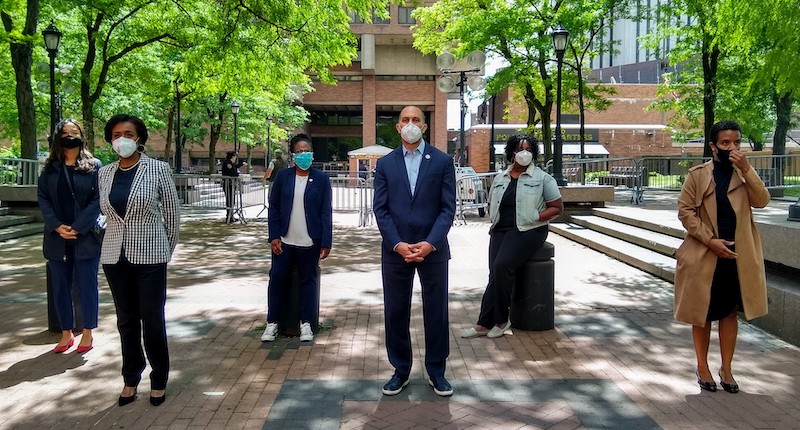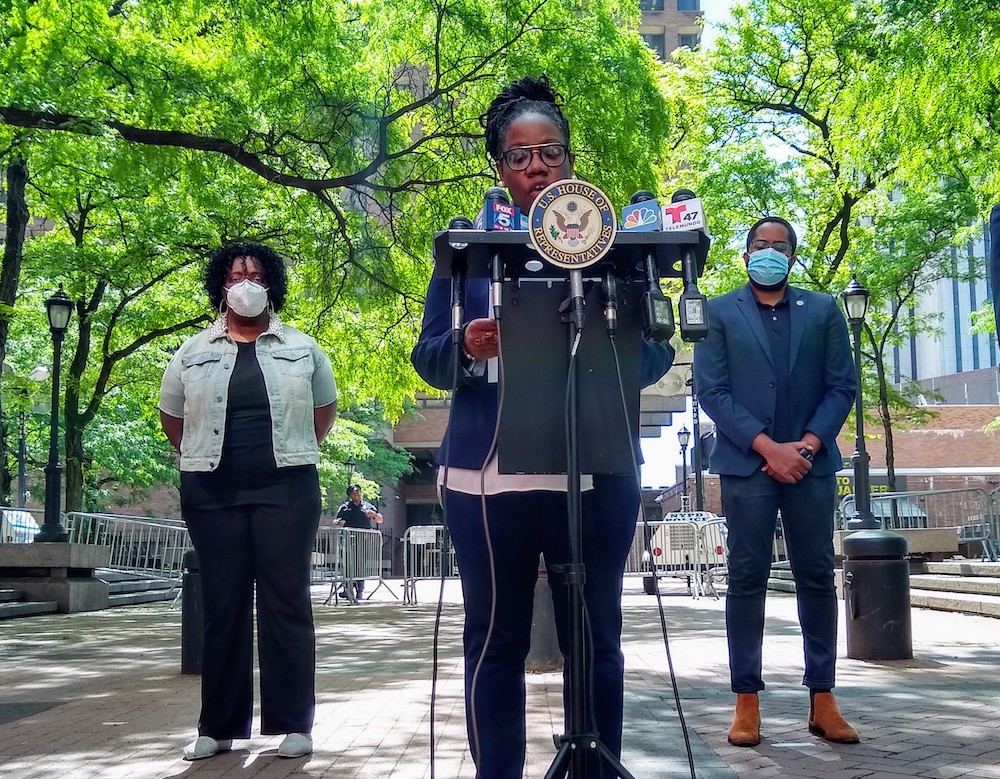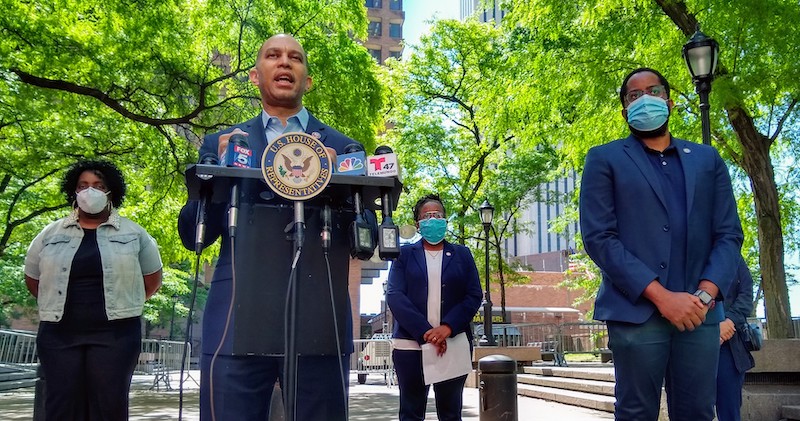As peaceful protests, rioting and looting stretched into its fifth day across the city yesterday a group of Central Brooklyn lawmakers convened outside the New York City Police central headquarters at One Police Plaza in Lower Manhattan and called for the firing of officers and commanding officers that use unnecessary tactics on peaceful protesters.
U.S. Reps. Yvette D. Clarke and Hakeem Jeffries, State Sen. Zellnor Myrie, Assemblymember Latrice Walker and City Councilmembers Alicka Ampry-Samuel and Majority Leader Laurie A. Cumbo discussed the commonality of police brutality and the assault on Dounya Zayer, a petite female that was shoved to the ground by Officer Vincent J. D’Andraia on Friday night, May 29.
Zayer suffered seizures and a concussion after hitting her head on the pavement. According to the video, Zayer was backpedaling in front of the officer with her phone out during a protest, not overtly attacking him.
“I’m here today with my fellow colleagues to express my outrage at the conduct of those within the ranks of the NYPD who have dishonored their oath to protect and serve, and worst of all have demonstrated their utter disdain for the very people who require their courtesy, professionalism, and respect,” said Clarke.
Myrie, who was pepper spayed and arrested at a protest for George Floyd days ago, said his title “allowed for me to not be processed. But, this young woman had no such luxury. She was manhandled and hospitalized by rogue officers that had no business on this force.”

The officials called for the firing of Officer D’Andraia, overseen by Deputy Inspector Craig Edelman, because of his reputation of being unnecessarily abusive while on the job in Brownsville at the 73rd precinct. “It would be negligent for me to allow this to continue to fester in our communities and not stand in unison and call, not for him to be moved, we don’t want him moved to do this to another neighborhood,” said Walker, “We want him removed.”
Ampry-Samuel said many cops of color don’t want to be associated with white counterparts or brutalizing officers and have complained in the past.
“When Black officers complain, not to the commander,” said Ampry-Samuel, “but to the elected officials saying that they are told, ‘If you start punching people in the face it won’t make us look so bad.’ It’s a pressure on the Black officers.”
More Black leadership and diversity in the police department has been a strong step towards progress, said Clarke, because they have experience and a connection to the communities they police.

The lawmakers contended that outside of people who just want to steal or are anarchists, the violence and unrest seen throughout New York over the last five days is a symptom of a much deeper anger towards the real problem. The problem is the crippling and often ignored systematic racism that is within the New York City Police Department, and other police forces, amplified by individual officers and exacerbated by a prevailing mentality from specific superiors that encourages barbarity in black and brown neighborhoods, they said.
“I, as an elected official, I can’t go to a protest and push somebody or a police officer and knock them to the ground and go back to work, then wait for some sort of investigation that’s never going to yield a result. That’s madness,” said Cumbo. “When we address the issues of justice, we will then be able to address the issues of looting.”
If anything D’Andraia’s firing, would be a symbol of accountability and change in how the department polices its own, concluded Jeffries.
“Our community embraces those good police officers who are in the neighborhood to protect and serve, but we reject those officers who are violent and abusive,” said Jeffries. “Any violent, brutal, abusive officer within the New York Police Department should be purged and held accountable to the full extent of the law. Not tomorrow, not next week, not next month, today.”
In addition to transparency and more diversity in the police department’s management, adequate legislation would also be effective in combating the root problems in the city’s police department, the lawmakers said.
“The 1994 crime bill,” said Jeffries, talking about the notorious ‘three-strikes’ provision that many felt led to mass incarceration under the Clinton administration, “We need to reverse engineer that and accelerate liberation and reinvestment into the communities that have been long forgotten.”
Walker said that the repeal of Section 50-A, a New York State civil rights law from 1976 that was originally intended to prevent defense lawyers from using police officer personnel records during testimony in a case, is a more immediate step.
Many minority state legislators are currently asking for its repeal because it’s kept police disciplinary records from the public, while law enforcement representatives have expressed concern about any changes.






